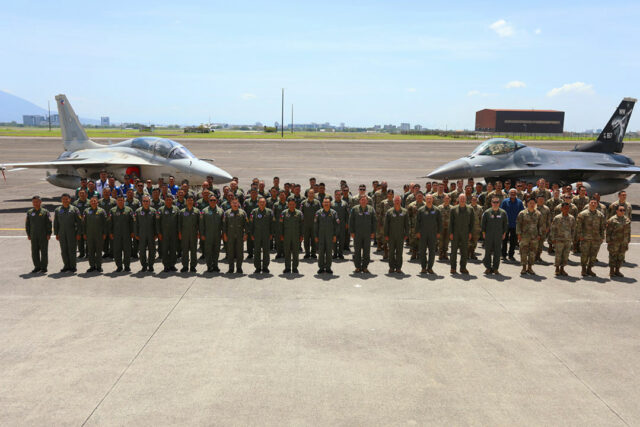By Kenneth Christiane L. Basilio and John Victor D. Ordoñez, Reporters
PHILIPPINE and US air forces kicked off their 11-day air combat exercises in Pampanga province north of Manila, the Philippine Air Force said on Monday.
They will hold drills focused on establishing air dominance and superiority, it said in a statement
Almost 1,000 airmen from the Philippine Air Force and US Pacific Air Forces will participate in Exercise Cope Thunder to be held throughout northern Luzon, according to a media kit given to reporters.
The Philippine Air Force said it would deploy nine air assets, including four FA-50 fighter jets, three A-29B Super Tucano turboprop warplanes and two helicopters for dogfighting drills, while the US will deploy a dozen F-16 fighter jets.
“This year’s iteration aims to develop asymmetric warfare capabilities for force projection and area denial, [and] enhance conventional capabilities to ensure superiority in air operations,” the Philippine Air Force said.
“[It would also] enhance cooperation with international and security partners to improve operational coordination, readiness, effectiveness and strategic deterrence,” it added.
Exercise Cope Thunder started in 1976 but was halted in 1991 after Mt. Pinatubo’s eruption damaged Clark Air Base and Subic Bay. That year, the Philippine Senate rejected a treaty that would have allowed US forces to continue operating bases in the country.
The exercise was revived in 2023.
Exercise Balikatan (shoulder-to-shoulder), the broader training drills between all major services of the Philippine and US forces, is scheduled for the last week of April until the first week of May.
The Philippines is also hosting airmen from Malaysia, Thailand, Australia, Japan and Indonesia’s air forces for this year’s aerial combat exercises.
“For the first time, the Philippine Air Force is hosting an International Observer Program as part of the exercise,” it said.
“The exercise will also feature subject matter expert exchanges, covering a wide range of domains including fighter and close air support operations, helicopter operations, cybersecurity, communications, aircraft maintenance, logistics, security and medical services,” it added.
Meanwhile, Philippine President Ferdinand R. Marcos, Jr. will ensure funding to fast-track the country’s military modernization program before his term ends in 2028, according to the presidential palace, amid rising tensions with China.
This comes after the US Department of State last week approved the possible sale of F-16 jet fighters and munitions worth $5.58 billion to the Philippines — a deal that could boost the Southeast Asian nation’s air combat capabilities.
“As we said, that is the truth — we are indeed facing issues,” palace spokesperson Clarissa A. Castro told a news briefing in mixed English and Filipino on Monday. “But the modernization is in accordance with the law.”
“Every effort, opportunity, and capability will be utilized, and if there is a need for a budget, the President will ensure it is done,” she added.
National Security Council spokesman Jonathan E. Malaya on April 3 assured China the acquisition is not intended as a threat to any nation and is just part of Philippine efforts to modernize its military.
He said the F-16 jet is the most advanced fourth-generation fighter in the world and could be a “significant upgrade” to Manila’s existing arsenal, which includes 12 FA-50 fighter jets from South Korea.
Chinese Foreign Ministry spokesman Guo Jiakun earlier said the Philippines’ defense and security cooperation with other countries should not “exacerbate regional tensions.”
China and the Philippines have been at loggerheads over confrontations near disputed features in the South China Sea, with Manila accusing China’s coast guard of aggression and Beijing furious over what it calls repeated provocations and incursions.
More than $3 trillion worth of trade passes yearly through the South China Sea, which China claims almost in its entirety. A United Nations-backed tribunal in 2016 voided its claim for being illegal.
The Philippines is keen on buying more missile systems, warships and multi-role fighter jets to upgrade the country’s capacity to defend its skies and seas, Armed Forces of the Philippines (AFP) Chief of Staff Romeo S. Brawner, Jr. said on April 5.
He earlier said the Philippines expects deliveries this year of at least two corvette vessels from South Korea, which last year elevated its ties with Manila to a strategic partnership.
NATIONAL BUDGET
The Philippines is in the third phase of its modernization program called Horizons. It has earmarked $35 billion for the military buildup over the next decade as it aims to counter China’s military might in the region.
The Philippine government had incurred a P2.1-trillion funding shortfall for the modernization effort as of August 2024, according to the House of Representatives think-tank. About P348 billion has been spent on military hardware upgrades since 2002, it added.
“We truly aim to procure what is necessary for the AFP modernization,” Ms. Castro said. “Of course, this will depend on our budget and whether Congress will approve it so all of these are commitments that the President truly wants to fulfill.”
In 2022, the Philippines bought $375 million worth of BrahMos anti-ship missile systems from India, and has orders for more.
The Philippines earlier said it is eyeing mid-range missiles and at least 40 fighter jets to boost its defense capabilities.
Meanwhile, the Philippines and Finland are exploring closer defense cooperation, with discussions also including the potential investment by a Finnish multinational company to support Manila’s self-reliant defense posture program, the Defense department said.
Defense Secretary Gilberto C. Teodoro, Jr. met with Finland’s Ambassador to the Philippines Sajia Nurminen last week and discussed how to advance defense collaboration between the two countries, the agency said in a statement.
“Finland seeks to cooperate with like-minded countries that uphold a rules-based international order, such as the Philippines,” it added.
Nokia Corp., a Finnish multinational telecommunication and consumer electronics company, is exploring possible investments in the Philippines to help boost self-reliant defense posture, Ms. Nurminen said, according to the statement.
Nokia also develops military communication systems, advertising it as capable for tactical coordination across land, sea and air domains, according to its website.
Mr. Marcos signed into law last year a bill providing incentives, such as value-added tax and import duty exemptions of materials and equipment needed for defense manufacturing to boost the local production of military equipment.
Republic Act No. 12024 or the Self-Reliant Defense Posture Act lets foreign companies set up shop in the Philippines via a joint venture with a local enterprise, granted that Filipinos hold at least 60% ownership.
The law was signed amid Philippine efforts to deepen security ties with other nations, such as South Korea, Australia and India, to bolster deterrence against China.
Manila is pressing ahead with military modernization, procuring warships from Seoul and missile systems from New Delhi to counter Beijing’s military might in the region.












